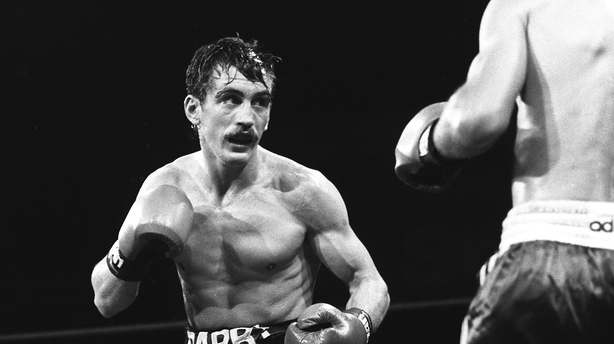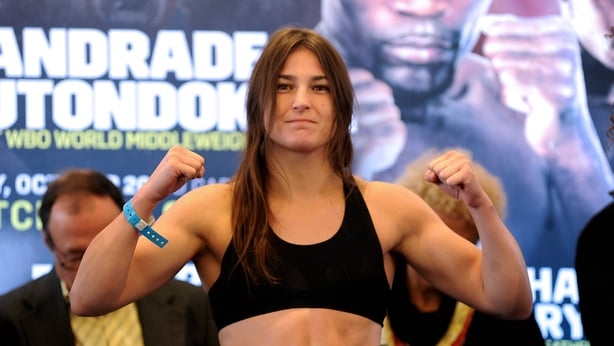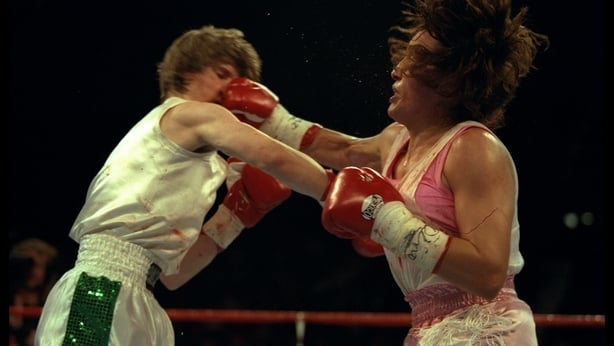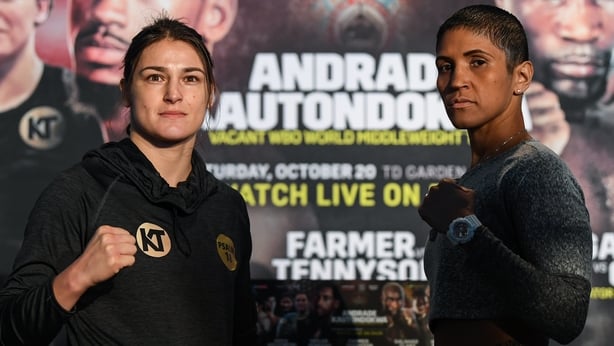"She never told her parents about boxing early on, they thought she had a boyfriend in the gym" - a commentator describing Drogheda native Deirdre Gogarty's background in boxing during a professional fight in 1996.
"Women's boxing at the time wasn't even allowed in the country, I had to pretend to be a boy to get fights" - Katie Taylor in the trailer of the Documentary 'KATIE', due for release later this month.
Two fighters a generation apart but with similar beginnings in boxing.
Shortly after the Drogheda woman won a world title in 1997, she received a letter from an 11-year-old Taylor containing words of congratulations and thoughts about her own hopes of representing Ireland in the Olympics one day.
It was a poignant moment for Gogarty but the pair had already met in person at that stage and Gogarty could instantly tell that the Bray brawler was destined to go far.
"I could just see a lot of myself in her," Gogarty tells RTÉ Sport from her home in Louisiana where she lives with her husband and four-year-old son Celton.
"I could tell her determination, there's not a lot of talk, she's all action.
"She's very serious and very dedicated about the sport. I could tell she was just as serious as I was coming up trying to get fights.
"She went through the same thing I did with not being able to get fights and exposure, training away in the gym all the time and not being able to show what she can do so well."
Not many people know about her but Gogarty was the original trailblazer for women's boxing in Ireland.
That fight in 1996 was on the undercard for a headline bout featuring Mike Tyson, and is generally regarded in boxing circles as the first fight to gain real recognition for women's boxing.
Taylor is fighting in a professional era where female fights are getting more regular turns on the pay-per-view circuit. That includes her fight this weekend against Cindy Serrano where Taylor is putting her 10-0 record as well as her WBA and IBF lightweight world belts on the line.
Back in '96, however, Gogarty's super lightweight clash with the Don King-promoted fighter Christy Martin was the first time women's boxing featured on PPV television. They were informed that the fight would be televised just one day before it took place and over one million people tuned in to watch.
By 1997, Gogarty was a world champion but her achievement stirred very little public attention at the time. The purse she was owed for her points-decision victory over Bonnie Canino was $12,500, but she never got to enjoy a single cent of it after the promoter ran off without paying anyone their share.
"Ironically, the biggest purse I was ever supposed to get, we never got paid," Gogarty recalls.
That disastrous end to what should have been the crowning moment of her career, was compounded by the fact that she had quit her day job as a graphic designer to focus on boxing at the time.
She was Ireland's first female professional boxer but she had to leave the country in order to do it, making her way through London and America before settling in Louisiana where she began to make real strides in her career.
Gogarty didn't come from a boxing family but she became interested in the sport after coming across the career of former world champion Jack Dempsey. She was captivated by the long distances he walked across the desert in order to fight and the bouts against heavier boxers that he took on.
Considering that women's boxing was basically illegal in Ireland at the time, she could identify with his struggles and was drawn in by his perseverance.
By the time Barry McGuigan became a world champion, there was a swell of support for boxing in Ireland which allowed Gogarty to feel more comfortable about showing her interest in the sport.
She was just 15 years of age at this stage and learning to box in secret.
"I didn't want people to think I was weird.
"When Barry won the world title, everybody loved him and the whole country was mad about Barry. It was kind of okay for me to express my interest in Barry McGuigan and boxing in general.
"But I still kept it secret that I was doing it myself. I was punching a bag in the cupboard and keeping it hidden.
"It took me another two years to work up the courage to actually walk into a boxing gym. It was a long process of me being okay with what my passion was."

She continued: "You could call it fate but my father moved his dental surgery into Drogheda and it happened to be right across the road from the boxing club so I used to sit in his waiting room and just stare over at the boxing club.
"I watched the guys going in and out to training. I studied it for months and months before I had the courage to actually walk over there and talk to somebody."
That first approach to that local boxing club was an intimidating experience for Gogarty. As she climbed the three flights of stairs to the gym, she was greeted by the echoes of fighters trading leather along with all the other sounds of the sport she wanted to immerse herself in.
"I did want to turn around and leave but I'm glad I kept going."
Since women didn't box in Ireland at the time, it was assumed that any time females did frequent a gym was for the purpose of looking on at the boys, hence why Gogarty's parents thought that their daughter was courting someone in the boxing club.
The coach had similar suspicions at the outset and told Gogarty she would have to watch the training sessions first if she had serious intentions of being a fighter.
After a few weeks of sitting through that apprenticeship, Gogarty had the club's permission to start sparring with the boys, and they welcomed her into the ring.
"The thing about a guy, once he gets in the ring with a girl he doesn't want to hit her, but if you hit anybody in the mouth hard enough, they're gonna hit you back. That's always my attitude and I made sure they fought back.
"Obviously I wasn't going away and the coach was like 'my God, she's here every night.' He wasn't expecting that and he said to join in. That's what I did and every step like that was a big milestone for me."

Katie Taylor fought in Ireland's first sanctioned female fight in 2001.
If those were the sort of barriers Taylor was punching through, you can imagine the kind of boxing world that Gogarty was entering when she was trying to find fights in Ireland with her then coach Pat McCormack.
As it turned out, she could only get one and it had to be called a kickboxing bout just to ensure that it went ahead.
It soon became apparent that Gogarty would have to leave Ireland if she wanted to persist with her passion.
The prospect of emigration in the name of sport during that time in Ireland would prompt many others to quit, but while those doubts often swirled about in her head, Fogarty simply couldn't give up.
She got a few fights in London and after she was instructed to seek out the coach Beau Williford in Louisiana, things started to pick up for her and bouts were easier to come by.
But even that was a struggle as Williford initially confessed that he knew nothing about women's boxing, and he 'put her through hell in the gym' in the hope that the torturous training would force her to put up the white flag and return home.
Within three weeks of her arrival, Gogarty had a fight to prepare for and she began to form a bond with Williford shortly after.
But following her dream came at a cost, one which she feels she is still paying to some extent today.
"I still feel like I'm paying the price for it," she says with the strains of an Irish accent breaking through her Louisiana twang.
"I have a great life here. I have a husband and a son and great friends. My coach Beau Williford is like my family here. But I still feel it was a huge sacrifice and I'm still an Irish girl at heart.

"There was always a million reasons to quit. Getting your butt kicked in the gym is enough to make anyone want to quit. But I just had this drive in me that I couldn't live without boxing. If I didn't do it I'd always regret it.
"It's very tough leaving home, I still miss it a lot and still get homesick a lot even all these years later. I don't really [get to come home much], it's just hard to get away. It's so far and expensive, I don't get home nearly as often as I'd like.
"Both my parents have passed away so the urgency to go home isn't as strong. It's just hard but I hope to bring my son to Ireland over the years. I really want him to experience his Irish roots."
Christy Martin's backroom team sought out Gogarty for that fight in 1996, giving her just 10 days' notice to prepare for it. The assumption was that Gogarty wouldn't be able to survive the six rounds.
By the second round however, Martin had a bloody nose and all of the determination that Gogarty poured into making a career for herself in boxing was spilling out onto the canvas in Nevada.
Mike Tyson v Frank Bruno was supposed to be the headline act that night but that underwhelming bout ended in the third round and the women's fight stole the show with what turned out to be a compelling contest.
Christy won via unanimous decision and went on to become a star in boxing. The bout did good things for Gogarty too but losing the most celebrated fight of her career still stings.
"I personally don't like to watch the fight because I see everything I could have done better. It's a bit painful for me," she says.
"I fought for a world title and nobody saw it. The one fight everybody knows and saw was the one I lost. I know it was a great moment for women's boxing but it's kind of mixed feelings for me.

"It was great for my career because I finally got the opportunities I'd been waiting for but I always feel if I'd fought a better fight I could have pulled out a draw or maybe even won."
Gogarty retired from boxing a year after she won her world title. A combination of persistent injuries, fights falling through and a lack of drive prompted her to hang up her gloves at 35. She had hopes of getting a rematch against Martin but that faded with time too.
She's a boxing coach now, imparting the advice that she received over the years to the next generation of fighters.
She's happy to see that women's boxing has made progress over the years, with debates shifting from whether or not they should be allowed box, to arguments about whether or not Taylor has been sufficiently tested yet since making the switch to professional boxing.
Taylor regularly mentions how Gogarty she influenced her career and Gogarty is confident that her contemporary can carry on the good work she did to get women's boxing off the ground.
They may have boxed in different eras, but their paths in the sport are not all that different.
"It's made fantastic progress and I think she's a shining example of it and I think she's going to be the person that really brings the sport forward.
"She's just so well rounded everything about her, her boxing style and her personality. She's just the epitome of a great athlete.
"I'd hate for her to carry the whole weight of the sport on her shoulders, there's other great women fighters out there but I hope the promoters keep promoting all the women because you can't have just one in a sport like boxing."


